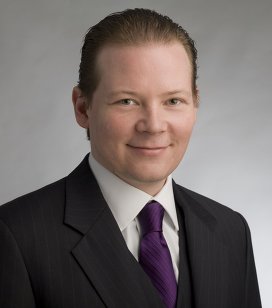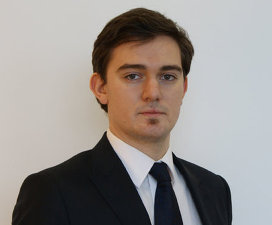Luxembourg has been widely hailed as an international investment center for years. The Association of the Luxembourg Fund Industry (ALFI) provides a number of reasons underlying the country’s designation as a top fund-industry choice. Its legal and regulatory framework for investment funds is recognized for its excellence by the global asset-management community. Luxembourg boasts a AAA economy as well as political and social stability. The country features a concentration of investment fund experts specializing in many different areas.
To gain further insight into the realities of investment funds, RAPSI consulted experts from Luxembourg’s leading independent business law firm – Arendt & Medernach. Our guests included Alain Goebel, a partner in the firm’s tax law practice, and Alexander Sokolov, Vice-Head of the firm’s Moscow Representative office.
RAPSI: What makes Luxembourg a particularly strong choice for investors?
Alain Goebel: Luxembourg is a highly developed and safe financial center. It has been a forerunner in the implementation of fund legislation in Europe, with the first law on investment funds dated 25 August 1983. In 1988, Luxembourg was also the first European Union member state to implement Council Directive (EEC) 85/611 on undertakings for collective investment in transferable securities (UCITS). Luxembourg has solid experience in this field – from industry people such as lawyers, accountants, custodians, bankers, as well as from the administrative side, e.g. the Commission de Surveillance du Secteur Financier (CSSF), which supervises the funds, or the tax authorities. Given the expertise, technical issues may thus be solved in an expedient and pragmatic manner.
Luxembourg company law is flexible and offers a complete range of different types of companies and partnerships, as you can expect from a highly-developed jurisdiction: joint stock companies, limited liability companies, general partnerships, limited partnerships, etc. Last year, Luxembourg introduced a limited partnership (société en commandite spéciale) corresponding to the Anglo Saxon limited partnership. Companies can be incorporated very rapidly and exist as soon as the articles of incorporation have been executed by the founder and the notary. Historically, the Luxembourg company law dated back from 1915 (based on the former Belgian company law from 1912) which is characterized by its liberal approach towards business (the underlying principle being that of the freedom to act, unless expressly prohibited). Other features of Luxembourg corporate law include straight-forward rules as regards the appointment and dismissal of managers, recognition of other governing laws, arbitration clauses, enforceability of shareholders’ agreements (tag along / drag along clauses also).
On top of that, in terms of litigation, Luxembourg courts are expedient and reliable. They recognize foreign governing laws, and enforce foreign judgments.
RAPSI: What does Luxembourg offer that would give it priority above the British Virgin Islands (BVI) or other popular offshore zones in the eyes of someone looking to set up a company?

Alain Goebel: You have to distinguish between offshore and onshore. The BVI companies are offshore International Business Companies (IBC) that are not subject to any taxes and hence not entitled to any double tax treaties and blacklisted in many jurisdictions. The Luxembourg companies are residents subject to corporate income taxes at a current maximum rate of 29.22% which is comparable to the tax rates in the other EU member States. In addition, Luxembourg companies are subject to a net worth tax levied at 0.5% per annum on their net assets. Hence, the may benefit from Luxembourg’s vast double tax treaties’ network, as well as the European Union Directives (e.g. Parent-Subsidiary Directive, Interest and Royalties Directive). Combined with certain specificities of domestic tax law, (e.g. absence of withholding tax on interest, royalties and liquidation proceeds) transactions and investments may be transparently structured via a Luxembourg company in a tax efficient manner.
RAPSI: So you don’t expect Luxembourg to run into trouble with the Russian market in light of the country’s commitment against tax havens?
Editors’ note: During his annual address to the legislature in December 2013, Russian President Vladimir Putin vowed that it was incumbent upon the country to fend off tax havens.
Alain Goebel: No, because Luxembourg is not a tax haven. It is not a country where you can hide assets in case of criminal investigations or amidst money laundering operations. Luxembourg has implemented all of the international standards in terms of the exchange of information for tax purposes. It has also implemented the Organization for Economic Co-operation and Development [OECD] standards. Furthermore, Luxembourg agreed to the exchange-of-information-upon-request clause in the new protocol to the Russian/Luxembourg double tax treaty. I cannot imagine what other safeguards Russia can expect from Luxembourg than those already existing.
RAPSI: Citing the OECD's Global Forum on Transparency and Exchange of Information for Tax Purposes, Reuters reported in November that "Luxembourg, Cyprus, the British Virgin Islands, Switzerland and the Seychelles do not meet international standards on tax transparency, potentially putting investments in the countries at risk." You mentioned though that while Luxembourg has a great deal to offer investors, it is not a tax haven. What do you think is the disconnect here? Why would it have been criticized for a lack of tax transparency?
Alain Goebel: The OECD confirmed that the current Luxembourg legislation in place is OECD compliant. It is rather the handling of the cases in practice which needs to be improved. In this respect, it has to be noted that any new legislation may always give rise to practical issues or delays. As a comparison, the European Union Savings Directive which provides for a EU-wide exchange of information dates back to 2003 and there are still a lot of practical issues in certain EU Member States. Also, the significant number of requests, arising mostly from France and Germany, need to be taken into account, in particular as regards the limited infrastructure of the Luxembourg tax authorities. The Luxembourg government has publicly committed to comply with the OECD standards and it is expected that such will be the case within a short period.
RAPSI: And at this point you feel no pressure from Russian regulators?
Alain Goebel: There’s no reason for such pressure. The Central Bank of Russia and CSSF have a memorandum of understanding so they can share certain information and consolidated reports on subsidiaries of Russian banks situated in Luxembourg.
Of course it’s not an exchange of information about the banks’ clients. If a Russian bank has subsidiary in Luxembourg, it’s fully supervised.
Regarding in particular the exchange of information upon demand from the Russian tax authorities, it must first of all be noted that in accordance with the OECD standards a number of conditions must be fulfilled. The information requested must be foreseeable relevant for an appropriate taxation in the requesting state, which excludes so-called “fishing expeditions” (Russian authorities could for example not request a list of all Russian residents that have deposits in Luxembourg). Precise information as to e.g. the identity of the person under examination, the nature and form of the information sought, the tax purposes for which the information is sought, the grounds for believing the information is held in Luxembourg also has to be provided. These are international standards as established in the OECD commentaries. In comparison to some countries that do not enforce those standards and have a very broad interpretation of them Luxembourg has very narrow interpretation because of the confidentiality principle.
RAPSI: Where do most of your international clients come from?
Alain Goebel: It depends on the industry. As regards investment funds, most promoters originate from the US, Germany and Switzerland, followed by a number of other European states. If you look at the banking sector, Germany, Switzerland and France are likely to be key countries. Luxembourg is a very international place, drawing investors from all over the world.
RAPSI: In terms of your US clients, do you find that they are primarily drawn to the corporate law benefits in Luxembourg or are they drawn to the tax benefits?
Alain Goebel: Both, actually. US clients often invest in Europe and they need a platform for organizational and commercial reasons. Luxembourg is geographically very well situated (heart of Europe) and is often used as a gateway to Europe. Clients can set up an investment platform in Luxembourg which invests in real estate, private equity, banking and at the same time provides intra-group services throughout Europe. We have witnessed the same trend with our Asian clients seeking a European platform. Situation, know-how and reputation are very often key decision factors. So there are other reasons beyond tax and corporate law considerations as well.
RAPSI: Do you have many Russian clients?

Alexander Sokolov: We have clients from all around the world: US, Chinese, European, South African, Russian. We try to position ourselves as a diversified financial center. However, we have a relatively small percentage of Russian and Commonwealth of Independent States [CIS] clients at this point.
Alain Goebel: Still, Luxembourg has always had good relations with Russia. There was already a Russian bank - East-West United bank (EWUB), a former Vneshtorgbank subsidiary, which has been established in Luxembourg since 1974. At the beginning of this year the official inauguration of Gazprombank Luxembourg took place. We expect that there are other players that might follow.
RAPSI: Would it be possible to assess statistics for the number of companies owned by Russians in Luxembourg?
Alain Goebel: In Luxembourg, we are very much attached to confidentiality and have very stringent professional secrecy rules. We want to protect private life. It’s really something that we fight for and that’s very important to us. That is why it would be quite difficult, if not impossible, to do any such research. That information is not publicly available.
Professional secrecy was not invented by Luxembourg. There’s a criminal sanction in our Criminal Code that was introduced when Luxembourg was occupied by Napoleon, who introduced the French Criminal Code in Luxembourg, and the provision on professional secrecy still remains. So that’s actually a French invention.
RAPSI: Do you think Luxembourg will be able to preserve its confidentiality incentives?
Alain Goebel: It is a hot topic. But as I said before Luxembourg is traditionally very keen on protecting private and professional life. The protection of private life must of course be lifted in cases involving criminal investigations and money laundering claims.
Many people have forgotten this, but Luxembourg was the first state in the European Union that had an anti-money laundering law back in 1973. We take it very seriously. Luxembourg is a founding member of both the OECD and the EU. So it’s clear that if international standards are being set Luxembourg will also implement those standards and play by the rules. But Luxembourg is not looking to implement legislation that would create competitive disadvantages in comparison to other jurisdictions.
RAPSI: What makes Luxembourg a comfortable choice for Russian investors?
Alain Goebel: We have had a double tax treaty with Russia since 1993, which was based on the OECD model and provided a reduced 10 percent dividend withholding tax rate. Since other treaties provided meanwhile a 5 percent reduced rate, the new protocol to the double-tax treaty, which entered into force on the first of January of this year, also provides for a lowered 5 percent rate. Accordingly, Luxembourg is on a level playing field with the other traditional jurisdictions used by Russian investors.
RAPSI: And has your client demographic changed in connection with the amended treaty’s entry into force?
Alain Goebel: It may be a bit too early to judge; it’s only early February. But I think what has changed is that more and more Russian players will be looking to Luxembourg for their investments. Certain players on the market have established themselves in Luxembourg, and we saw that once they moved others were getting more interested as well.
RAPSI: So you have seen a significant increase in Russian clients since the banking crisis in Cyprus?
Alain Goebel: That’s difficult to judge. What we saw was a huge interest in Luxembourg after the Cyprus banking crisis, but not necessarily that so many clients moved out from Cyprus. Most clients were looking for alternatives in case things get worst. Maybe more moves will take place this year, since the protocol has meanwhile been ratified and the amended treaty is now in force. So let’s see what 2014 will bring in that sense.
Alexander Sokolov: We have also witnessed that the companies that showed a genuine interest in moving to Luxembourg were the most “sophisticated” companies with significant amounts of investments. Indeed, the tax structuring in Luxembourg is sometimes more complex and a certain degree of business substance is needed. These additional costs are of course less relevant for significant businesses that are used to more complex tax structuring through their international activities.
RAPSI: In terms of your Russian clients, is it all about taxes or are there other benefits that tend to attract them?
Alexander Sokolov: From what we’ve seen, Russian companies coming to Luxembourg are not primarily motivated by tax. The main driver is generally to attract investors to Russia or to put together a joint venture in a neutral setting. You might have a joint venture between a Chinese investor and a Russian company. Where you should establish a company – in China or in Russia?
I think the best idea is to choose an alternative. That’s why they’re coming to Luxembourg, where they can quickly and easily make straight forward decisions for quite large transactions. The motivation is more on the side of operational and legal protection. Tax-wise – there are a lot of countries in the world which can offer friendly taxation, or no taxation at all. Luxembourg is a bit different.
First they come for protection or for the stable financial atmosphere – because Luxembourg is still a AAA rated country, as recently confirmed by Fitch Ratings, Inc. So that’s why international investors trust in the stability of the financial structure.
Alain Goebel: Unfortunately for me, not everything is tax-driven, but the reasons are various and if you take the statutory income tax rate in Russia and compare it to Luxembourg or any of the EU countries – it’s much more attractive to pay your taxes in Russia. But I think that there are a lot of other arguments. Tax is just one thing. Of course everyone tries to minimize tax, and only to pay what he really needs to pay. Nobody wants to make a gift to the treasury. But usually the key elements are corporate and financial laws, legal certainty and reliability of the courts. A lot of businesses say simply, “If we do this deal, we want to have legal certainty. If we have to pay taxes, we will pay them”.
RAPSI: Luxembourg is maybe the best place to organize a business – but do your clients choose to litigate in London still? What causes this to happen?
Alain Goebel: You can perfectly well have a Luxembourg company or fund, and a shareholders agreement that is governed by English law, which is usually the case.
Why English law? Well if we take Alexander’s example and we have Chinese and Russian joint venture partners that are setting up a company and they want to have a governing law, first of all – they do not necessarily have knowledge of Luxembourg law, in the same manner as the Chinese counterparty is not familiar with Russian law and the Russian counterparty with Chinese law.
English law is more or less the preferred governing law in these kinds of international transactions. I’m not an expert in English law, but as far as I understand, English law is very protective and expedient.
Interviewed by Ingrid Burke, Vladimir Yaduta.



